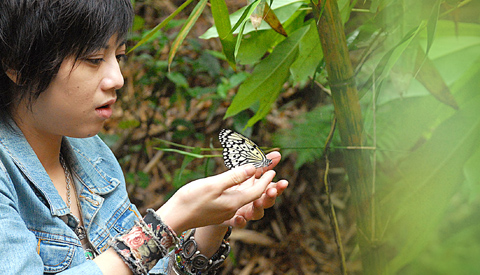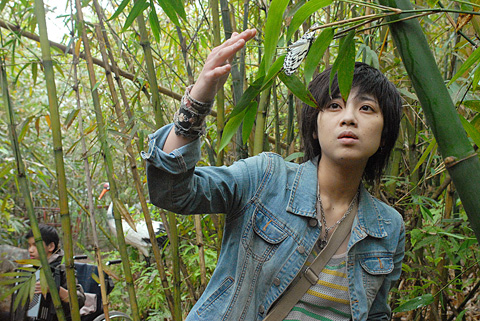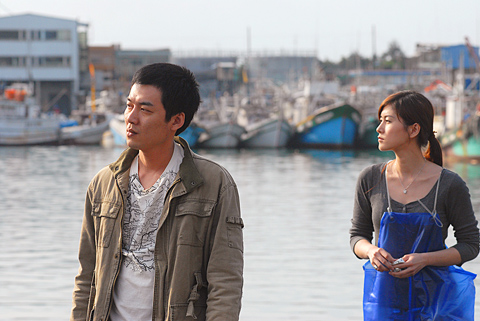Soul of a Demon (蝴蝶), celebrated director Chang Tso-chi's (張作驥) first film in five years, almost didn't make it to the big screen. Originally envisioned as a work of magic realism aided by CGI effects, the production came to a halt when the animation production company backed out of the project. After scraping together a new budget, Chang and his team re-shot the movie one year later. The result is a sober human drama about a tormented gangster who is unable to disengage from the cycle of violence and his troubled relationship with his father.
Set in Nanfangao (南方澳), a fishing port built by the Japanese, the film begins when Che (Tseng Yi-che) returns home from jail. Che took the rap for his younger brother, Ren (Cheng Yu-ren), who had stabbed to death the son of a local mob boss.
To reconnect with his semi-Aboriginal roots, Che visits his mother’s grave in Orchid Island (蘭嶼) with his ex-girlfriend Pei (Chen Pei-chun), who is mute from past emotional trauma.

PHOTO: COURTESY OF CHANG TSO CHI FILM STUDIO
Meanwhile, Ren returns from hiding in Japan with the brothers’ father, Chang (Michio Hayashida), whose departure from the family home led to his wife’s suicide. Old hatreds erupt, and violence rears its ugly head.
The title of the film comes from the Tao (達悟) word for butterfly. Tao tribal tradition holds that at the moment of death, a person’s soul leaves their body much in the same way as butterflies flutter towards the sky.
From images of butterfly wings shimmering on bamboo trees and the deserted amusement park where Che is abandoned by his father, to a glove puppet performance on the seashore, the film creates an atmospheric world in which the troubled protagonist is eventually consumed by his past and memories.

PHOTO: COURTESY OF CHANG TSO CHI FILM STUDIO
Though death, wickedness and human tragedy are motives in Chang’s work, the director’s sense of fatalism is taken to new heights in Soul of a Demon: men find no way to escape the vicious cycle of und erworld vendetta and women are either crippled, mute or dead. Chang’s Nanfangao is dismal and bleak, and suffocates the characters.
The fishing port is an ideal vehicle for Chang’s contemplative reflection on Taiwan’s history and the country’s hybrid cultural and political identities. By adding the role of Che’s grandfather, a photographer who came to Nanfangao with a Japanese construction team, to the story, Chang reveals the history of Nanfangao as one of the places where the first wave of Japanese soldiers and civil servants arrived in Taiwan. Che’s conflicts with his family, therefore, can be read as a metaphorical reference to Taiwan’s historical relationships with Japan and the nation’s Aborigines.
With the divine dancing Eight Generals (八家將) practitioners in Ah Chung (忠仔, 1996), the blind and gangsters in Darkness and Light (黑暗之光, 1999) and the deprived youth in The Best of Times (美麗時光, 2002), Chang excels in revealing the beauty and ugliness of life through the stories of social underdogs. In Soul of a Demon, the motifs are all there: gangsters, people with disabilities and a dysfunctional family. Yet the film is likely to be seen as one of Chang’s less successful pieces, since the story is oftentimes strays and becomes lost in the director’s auteurist exercise.

PHOTO: COURTESY OF CHANG TSO CHI FILM STUDIO
The film is, perhaps, like the director himself readily admits, a faithful reflection on the chaos of his life, frustrations and the passing of his father five years ago.

The People’s Republic of China (PRC) invaded Vietnam in 1979, following a year of increasingly tense relations between the two states. Beijing viewed Vietnam’s close relations with Soviet Russia as a threat. One of the pretexts it used was the alleged mistreatment of the ethnic Chinese in Vietnam. Tension between the ethnic Chinese and governments in Vietnam had been ongoing for decades. The French used to play off the Vietnamese against the Chinese as a divide-and-rule strategy. The Saigon government in 1956 compelled all Vietnam-born Chinese to adopt Vietnamese citizenship. It also banned them from 11 trades they had previously

Growing up in a rural, religious community in western Canada, Kyle McCarthy loved hockey, but once he came out at 19, he quit, convinced being openly gay and an active player was untenable. So the 32-year-old says he is “very surprised” by the runaway success of Heated Rivalry, a Canadian-made series about the romance between two closeted gay players in a sport that has historically made gay men feel unwelcome. Ben Baby, the 43-year-old commissioner of the Toronto Gay Hockey Association (TGHA), calls the success of the show — which has catapulted its young lead actors to stardom -- “shocking,” and says

Jan. 12 to Jan. 18 At the start of an Indigenous heritage tour of Beitou District (北投) in Taipei, I was handed a sheet of paper titled Ritual Song for the Various Peoples of Tamsui (淡水各社祭祀歌). The lyrics were in Chinese with no literal meaning, accompanied by romanized pronunciation that sounded closer to Hoklo (commonly known as Taiwanese) than any Indigenous language. The translation explained that the song offered food and drink to one’s ancestors and wished for a bountiful harvest and deer hunting season. The program moved through sites related to the Ketagalan, a collective term for the

Inside an ordinary-looking townhouse on a narrow road in central Kaohsiung, Tsai A-li (蔡阿李) raised her three children alone for 15 years. As far as the children knew, their father was away working in the US. They were kept in the dark for as long as possible by their mother, for the truth was perhaps too sad and unjust for their young minds to bear. The family home of White Terror victim Ko Chi-hua (柯旗化) is now open to the public. Admission is free and it is just a short walk from the Kaohsiung train station. Walk two blocks south along Jhongshan